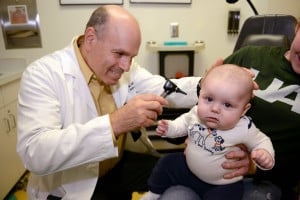
Are there any moments more precious than watching your baby take her first steps? She tries and tries again, succeeding, failing, falling.
Of course, it takes time for your baby to learn how to coordinate her muscles, movements and balance so that she can begin to walk properly. But what if she continues to fall, even after the normal learning period has passed?
Or if your toddler suddenly starts losing her balance at odd moments, or begins walking into tables or walls? Or an older child knocks into things, drops objects or seems unsteady in her gait?
Because a healthy inner ear is essential for maintaining our balance, persistent clumsiness in your child could be a sign of an ear infection or other ear problem, including hearing loss. How can you tell if your baby or child is experiencing a normal amount of clumsiness or if the health of their ears and hearing is in danger?
Possible Symptoms of Hearing Loss in Children
The board-certified ear nose and throat experts at Pediatric ENT Associates, part of Children’s of Alabama, share the following signs and symptoms to watch out for:
Does Your Child’s Ear Hurt?

An inflamed or infected middle ear can affect balance. If your clumsy child seems cranky, rubs her ear, had a recent ear infection or is susceptible to swimmer’s ear, contact your pediatric ENT for an evaluation and treatment.
Is Your Child Unresponsive?
Clumsiness and dizziness aren’t the only signs of potential hearing loss. If your baby doesn’t respond to your voice or to loud noises, their hearing may be impaired. Toddlers and older children who don’t understand what you’re saying, ask you to repeat yourself and have speech problems may also be struggling with their hearing.
Contact your pediatric ENT immediately if you notice the following in your son or daughter:
- Reacts inconsistently to noises or sounds or doesn’t react at all (after age 6 months)
- Reacts to your presence, but not your voice
- Has delayed or unclear speech
- Doesn’t follow directions
- Turns up the volume on TVs, radios and other devices
Learn more about child hearing loss at FDA.gov.
Schedule an Appointment for a Pediatric Ear Screening
The best way to prevent hearing loss and middle-ear problems in babies and children is regular screening at Pediatric ENT Associates. Babies who aren’t screened at birth should have their first hearing test by 1 month old and no later than 3 months. Older children should be screened again before starting school and then annually as part of their wellness exams.
At Pediatric ENT Associates, our skilled doctors have the experience and training to diagnose and treat a broad range of ear abnormalities and hearing problems using the most advanced treatment options available. To set up a screening or consultation, contact the pediatricians at Pediatric ENT Associates. You can reach us by calling our offices in Birmingham, Alabama or via this online form.

